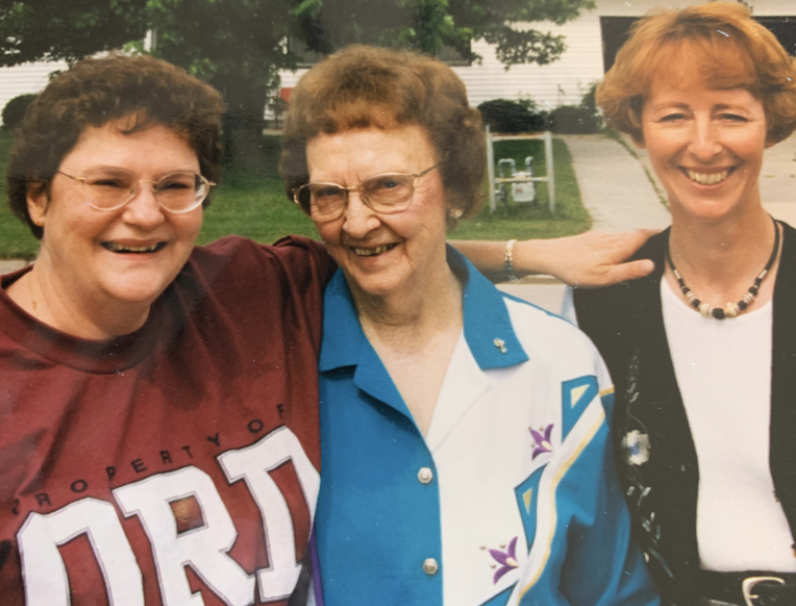The sounds are silenced.
For nearly 50 years we exchanged cards and phone calls on our birthdays. I wasn’t too concerned when mine didn’t arrive March 1. Things happen. Then we were gone for several days. I knew there’d be a card waiting when I returned home. But no.
With an uneasy feeling, I went on the prowl. Lyn lived alone, and while she wasn’t really a loner, her circle of friends was small. I knew none of them. Nor did I have any contacts on the family side. She was a divorcee and never had any children. My next step, hesitantly, were the newspaper obituaries. There it was. She had died, age 70, late February. I was stunned. Last we talked was when she called me in January, just touching bases about COVID and other generalities. She sounded fine.
How do I express my condolences? And to whom? I called the funeral home to ask if they would forward a sympathy card to the family. I had no other way of reaching out. It remains to be seen if I hear back from any of her relatives.
For now I’m still wondering. What happened? What were the circumstances? But first, a few reflections:
In high school, Lyn and I shared the love of music and were active in band and chorus. She had a beautiful voice; mine, a second rate alto, but we teamed up to sing a duet, harmonizing on the Simon and Garfunkel song, “The Sounds of Silence.” We were also cheerleaders together and shared lots of good times.
After high school, our paths took wildly different routes. She went to college out of state to major in music but then soon went on the road, singing with a band. Our only contact for many years was through that annual birthday card. The singing gig didn’t last too long; neither did her marriage. Eventually, she returned to Nebraska to live in the same town as her mother. At that point, we saw each other about once a year and still continued those annual birthday contacts.
We often stayed with my mother when we returned to Ord for high school reunions. Lyn considered my mother her “second mom.”
She worked for a time as a bank teller but eagerly awaited her 65th birthday so she could retire and go on Social Security. After her mother died, she slowly and painstakingly worked through the details of Jean’s estate and seemed to lack the energy to do much of anything else. Singing, reading, swimming — all the hobbies she used to loved — sort of evaporated. It was almost as if she had nothing to live for. My husband, who also had known Lyn for a long time, remarked that he didn’t expect her to live a lot longer once her mother died. That was a mere four years ago.
I loved Lyn, and I will miss her. And I will continue to wonder how and why the light went out in her life, both physically and figuratively. Why did she seem to lose interest in life. Was she depressed or lonely? I don’t think so. She liked her alone time, as do a lot of people. Solo living is on the upswing worldwide. A report from the UK’s Administration on Aging noted that the number of adults living alone has nearly doubled in the last 50 years, and, as one might expect, nearly half of those “soloers” are women.
While my situation is a far cry from Lyn’s, it gave me pause to think about my final arrangements. Who would I want to have contacted at my demise, and would my family know how? Do I have a trail that my family can follow? My daughters know a lot about my friends, so I’m fairly sure they’d know some details but maybe not all.
Tending to details like that is easy to put off. Still it should be done. I read recently about a son and daughter who’d lost their one remaining parent quite suddenly. In going through her things they discovered a “When I Die” file that had all the necessary documents like a will and living trust, passwords to all her gadgets, an ethical will, letters to loved ones and a list of friends to contact when she’d passed. Paging through public television’s Signals catalog, I saw a hard cover book entitled “I’m Dead, Now What?” Again, it spelled out all the necessary documents and information to compile for whomever will be responsible for you and your effects upon your death.
In Lyn’s case, I knew of one friend she depended on who lived in the same town. Lyn’s aunts and cousins were all in faraway towns. I just hope she and her friend were in close and regular contact so that if Lyn died at home, alone, her silence did not go unnoticed for long.
As I shared this experience with my good friend and neighbor, we agreed that this is one of the realities of getting older — loss and death, of friends and family members. Their sounds will be silenced, but fortunately the memories live on. There’s no permanency to life. We all know that even though we don’t like to admit it. But we carry on because death is a part of life.
I’ll miss you, Lyn. Thanks for the memories.



